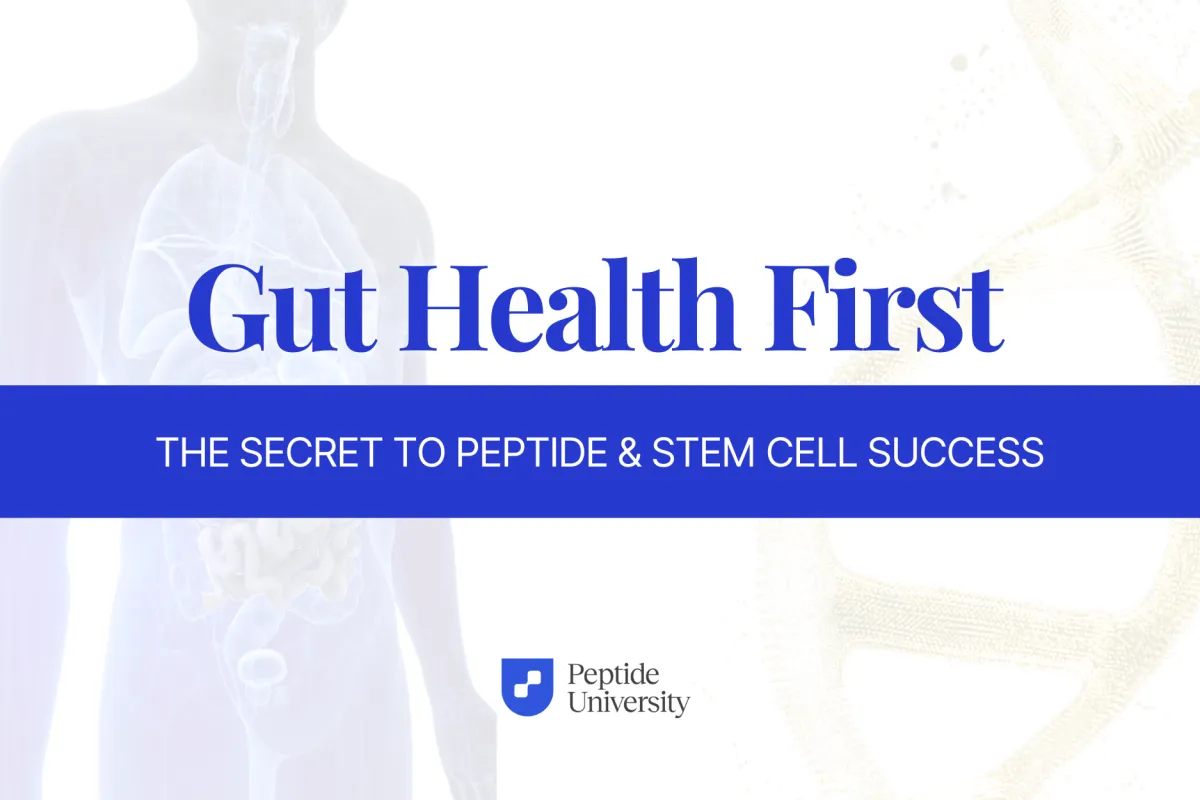
Back to Basics: Why Gut Health and Nutrition Must Come Before Peptide or Stem Cell Therapy
In the evolving world of regenerative medicine, peptides, stem cells, and exosomes are often positioned as the cutting edge of healing. But many clinicians and patients overlook a crucial reality: if the foundation of health isn’t in place—especially gut health and diet—these advanced therapies can backfire.
In this article, we’ll explore why starting with the basics matters, the risks of skipping steps, and how clinicians can set patients up for success before introducing peptides or cellular therapies. (Scroll down to watch the video excerpt from Dr. Melissa Petersen’s PepTalk with Dr. Rafael Gonzales, available in full inside Peptide University).
Why Some Patients Fail to Respond to Advanced Therapies
Patients struggling with chronic viral loads—such as elevated IgG for EBV, HSV-1, or CMV—often experience exhaustion, neurological symptoms, and breathing issues. Post-COVID, this pattern has become even more common.
When practitioners jump straight into peptides, exosomes, or stem cells without first addressing diet, absorption, and immune burden, they risk:
Incomplete results – Therapies don’t “land” effectively.
Overactive immune responses – Patients may experience worsened symptoms.
Potential injury – Cellular therapies can fuel viral overload if the system isn’t ready.
In short, applying advanced therapies to an unprepared system is like planting on a neglected lawn—without clearing the weeds first, nothing thrives.
The Foundational Step: Reduce the Burden Before Adding More
Speaker 2 in the video uses a helpful analogy: if inflammation is like fire or a crowded noisy room, adding a new therapy is like whispering into the chaos. The message won’t be heard.
The right sequence looks like this:
Assess the overload – Identify infections, toxins, or stressors weighing on the system.
Reduce and remove first – Clean up inputs like poor diet or inflammatory foods.
Replace and replenish later – Once the system is receptive, then introduce peptides or regenerative therapies.
Why Food and Gut Health Are Non-Negotiable
Patients eat three times a day (or more). That means nutrition is the most frequent and direct input into the body. If the gut isn’t able to absorb nutrients, no supplement or therapy can fully succeed.
Some key takeaways:
Clean nutrition matters most. Whatever dietary approach is chosen, quality and cleanliness are non-negotiable.
Vegetarian diets and aging women. Clinically, long-term vegetarianism has been shown to contribute to nutrient depletion, reduced bone marrow quality, and premature aging in women.
Flexibility works best. Individualized, clean eating plans—such as cyclical or flexible approaches—tend to support better outcomes.
For a deeper dive into how clinicians integrate these principles with advanced peptide and cellular therapies, join Peptide University and gain access to exclusive trainings.
The Risk of Skipping Steps
Without a systematic approach, clinicians risk unintentionally harming patients. For example, introducing stem cells into a patient with an unresolved viral burden may increase viral replication instead of regulating the system.
The right sequence of care ensures:
Patients avoid unnecessary injury
Therapies are more effective
Long-term health outcomes improve
Watch the Video Excerpt
Here’s a clip from Regenerative Medicine Breakthroughs: Peptides, Stem Cells, Exosomes & Safe Clinical Applications for Longevity — a PepTalk interview with Dr. Melissa Petersen and Dr. Rafael Gonzales.
Want the entire interview plus access to all PepTalks, certification courses, and resources? It’s available exclusively for members of Peptide University.
Key Clinical Takeaways
Always assess the gut and nutrition first before peptides or stem cells.
Clean, nutrient-dense food is the foundation of all healing.
Reduce systemic overload before attempting to regulate or replenish.
Advanced therapies thrive in a prepared system—not a burdened one.
Unlock the Full PepTalk and More Inside Peptide University
This blog only scratches the surface of the full insights shared by Dr. Melissa Petersen and Dr. Rafael Gonzales. Inside Peptide University, members gain:
✨ Unlimited PepTalk access – Including Regenerative Medicine Breakthroughs and dozens more expert interviews.
📚 Clinical education & certifications – Practical strategies you can use with patients right away.
🤝 Supportive professional community – Connect with like-minded practitioners.
🔑 Exclusive resources & tools – From dosing guides to clinical case studies.
👉Click here to enroll in Peptide University and access the full PepTalk today.


